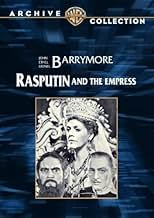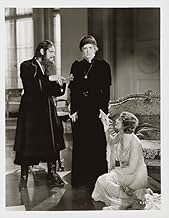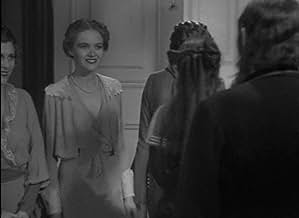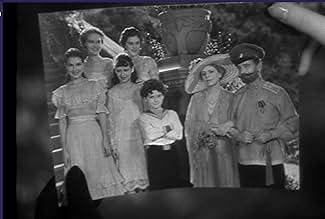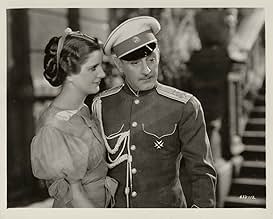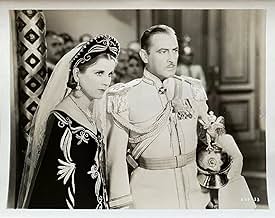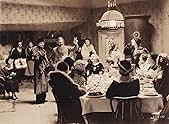IMDb RATING
6.5/10
1.3K
YOUR RATING
A prince plots to kill the mad monk Rasputin for the good of the czar, the czarina and Russia.A prince plots to kill the mad monk Rasputin for the good of the czar, the czarina and Russia.A prince plots to kill the mad monk Rasputin for the good of the czar, the czarina and Russia.
- Nominated for 1 Oscar
- 4 wins & 1 nomination total
Luis Alberni
- Photographer's Assistant
- (uncredited)
Mary Alden
- Natasha's Lady in Waiting
- (uncredited)
Robert Anderson
- Undetermined Secondary Role
- (uncredited)
Oscar Apfel
- Undetermined Secondary Role
- (uncredited)
Henry Armetta
- Photographer
- (uncredited)
Hooper Atchley
- Rasputin's Henchman
- (uncredited)
Mischa Auer
- Butler Pouring Drinks at Party
- (uncredited)
Barbara Barondess
- Woman Getting Cigarette
- (uncredited)
Max Barwyn
- Bald Man Trying to See Duna
- (uncredited)
Featured reviews
A true example of the assembly line style film-making of the old studios, where one doubts if the screenwriter ever visit the set, or did the director ever sit at an editing bench. Lionel Barrymore, however is a treat as the grimy, kooky Rasputin. He doesn't go for one-note scary. He's seen as a fun party animal, a believable healer, and the world's worst dinner guest. Other than that, John is wasted as the hero, as is their sister Ethel.
Rasputin and the Empress (1932)
*** (out of 4)
Lionel, John and Ethel Barrymore star in this film, which was the only one that all three legends appeared in together. After her son is near death, Czarina Alexandria (Ethel) lets the monk Rasputin (Lionel) pray with her son who eventually heals and the monk gives credit to God. Saving her son, the monk soon finds himself gaining power inside the government but this doesn't sit well with Prince Chegodieff (John) who will stop at nothing to prove the monk is mad. Apparently MGM was sued due to how inaccurate the story is here so if you want a history lesson you should go read a book but if you want to see all three Barrymore's together then this is the only film out there that will suit you. The film should have been a lot better than it is but the thing drags at several points and I'm sure fifteen or so minutes could have been trimmed from the 123-minute running time, although apparently the film ran longer when originally released. The performances aren't what you'd expect but it's certainly fun seeing the three Barrymore's working together. Lionel actually goes way over the top, which is something you'd expect from John but he actually manages to be quite calm and cool throughout the film. John certainly gives the best performance but it's Lionel who steals the film with his fake beard and over the top antics. Ethel is good in her role as is the supporting work from Ralph Morgan. The costumes and set design are wonderful and I really enjoyed the made up ending, which contains some pretty strong violence.
*** (out of 4)
Lionel, John and Ethel Barrymore star in this film, which was the only one that all three legends appeared in together. After her son is near death, Czarina Alexandria (Ethel) lets the monk Rasputin (Lionel) pray with her son who eventually heals and the monk gives credit to God. Saving her son, the monk soon finds himself gaining power inside the government but this doesn't sit well with Prince Chegodieff (John) who will stop at nothing to prove the monk is mad. Apparently MGM was sued due to how inaccurate the story is here so if you want a history lesson you should go read a book but if you want to see all three Barrymore's together then this is the only film out there that will suit you. The film should have been a lot better than it is but the thing drags at several points and I'm sure fifteen or so minutes could have been trimmed from the 123-minute running time, although apparently the film ran longer when originally released. The performances aren't what you'd expect but it's certainly fun seeing the three Barrymore's working together. Lionel actually goes way over the top, which is something you'd expect from John but he actually manages to be quite calm and cool throughout the film. John certainly gives the best performance but it's Lionel who steals the film with his fake beard and over the top antics. Ethel is good in her role as is the supporting work from Ralph Morgan. The costumes and set design are wonderful and I really enjoyed the made up ending, which contains some pretty strong violence.
Rasputin and the Empress shouldn't be used as a lesson of pre-Soviet Russia. Names have been changed (and that didn't prevent MGM from law suits) and a lot of the information we now know about this period of Russian history - was not known in 1932.
As other people have commented about this being the only film that Ethel, John, and Lionel Barrymore appeared together, this movie doesn't show why the Barrymores have the reputation that they have. John Barrymore's career started going downhill after the introduction of sound. Lionel Barrymore, wearing one of the phoniest fake beards, tries to capture the charisma and sense of control that Rasputin had over Czarina Alexandra and the Czarevitch. Ethel Barrymore gives an understated performance - too understated at times. When her only son seems to be close to possible death, she doesn't seem all that bothered.
C. Henry Gordon is a great Grand Duke Igor, Ralph Morgan is a convincing Czar Nicholas II, but they don't appear that frequently. Don't expect anyone to speak with a Russian accent or even attempting and accent.
Rasputin is one of the most interesting people in the world during the early 20th Century. He was also one of the most enigmatic and contradictory. A holy man who was accused of raping a nun, excessive drinking, and being power hungry. Barrymore's portrayal of Rasputin plays this up, plus making claims that he will be Russia. He seems almost like Charles Manson at times in the way he can make someone, especially the Czarevitch, behave like they are totally different people compared to the way they acted before meeting Rasputin.
It is best to watch this movie as just that - a fictional representation of various accounts of what happened in the royal court of Russia in its final days. The writers included Charles MacArthur, Ben Hecht, Robert Sherwood, Mercedes de Acosta, and Lenore Coffee - some of the best writers of the period.
It's worth a view - don't expect historical accuracy, but it is an interesting film that tries to show a much different world than what Americans would have known.
As other people have commented about this being the only film that Ethel, John, and Lionel Barrymore appeared together, this movie doesn't show why the Barrymores have the reputation that they have. John Barrymore's career started going downhill after the introduction of sound. Lionel Barrymore, wearing one of the phoniest fake beards, tries to capture the charisma and sense of control that Rasputin had over Czarina Alexandra and the Czarevitch. Ethel Barrymore gives an understated performance - too understated at times. When her only son seems to be close to possible death, she doesn't seem all that bothered.
C. Henry Gordon is a great Grand Duke Igor, Ralph Morgan is a convincing Czar Nicholas II, but they don't appear that frequently. Don't expect anyone to speak with a Russian accent or even attempting and accent.
Rasputin is one of the most interesting people in the world during the early 20th Century. He was also one of the most enigmatic and contradictory. A holy man who was accused of raping a nun, excessive drinking, and being power hungry. Barrymore's portrayal of Rasputin plays this up, plus making claims that he will be Russia. He seems almost like Charles Manson at times in the way he can make someone, especially the Czarevitch, behave like they are totally different people compared to the way they acted before meeting Rasputin.
It is best to watch this movie as just that - a fictional representation of various accounts of what happened in the royal court of Russia in its final days. The writers included Charles MacArthur, Ben Hecht, Robert Sherwood, Mercedes de Acosta, and Lenore Coffee - some of the best writers of the period.
It's worth a view - don't expect historical accuracy, but it is an interesting film that tries to show a much different world than what Americans would have known.
A prince plots to kill the "mad monk" Rasputin for the good of the czar, the czarina and Russia.
In something of a minor epic, this film tells of the rise and fall of Rasputin, the "mad monk". How much is true and how much is legend is open to debate, but all the classic parts of the story are told here. If you are vaguely familiar with the story of Rasputin, this film should feel like you've seen it before (in a good way).
Everything about the film is quite good, from the acting to the costumes and beyond. This is, of course, a showcase for the Barrymore family, and it really does show how much they each contributed to the acting greatness of American cinema.
In something of a minor epic, this film tells of the rise and fall of Rasputin, the "mad monk". How much is true and how much is legend is open to debate, but all the classic parts of the story are told here. If you are vaguely familiar with the story of Rasputin, this film should feel like you've seen it before (in a good way).
Everything about the film is quite good, from the acting to the costumes and beyond. This is, of course, a showcase for the Barrymore family, and it really does show how much they each contributed to the acting greatness of American cinema.
Plot in a Nutshell: Russian Prince Chegodieff (John Barrymore) tries to stop the evil Rasputin (Lionel Barrymore) from exerting his influence over Czarina Alexandra (Ethel Barrymore).
Why I rated it a '7': That's a lot of Barrymore! Admittedly, that fact alone doesn't make it a 7, but seeing the three accomplished siblings together here (for the only time in celluloid history) IS worth a few extra points. This is an interesting tale, showing how an unknown/outsider was able to insert himself into the lives of the Russian royal family and influence them in ways one wouldn't think possible. I will say that the film goes out of its way to denigrate Rasputin. I don't think he needed any help, really, but in addition to his actual crimes, he is shown here to be a war-monger, royal rapist and freedom-hating enemy of the peasants. Lol that's quite a despicable guy! Some reviewers have complained that "Rasputin" is not always true to history (in some ways, it's not), but what this tells me is that Hollywood apparently has been making historically inaccurate films for perhaps longer than anyone thought. If you can forgive it that, it's otherwise pretty entertaining.
Best line: "You know, people with visions like yours, my dear father, are sometimes rather unlucky. There was a general, not long ago, who shot himself in the back. No one could understand quite how he did it!"
Would I watch again (Y/N)?: Yes.
Why I rated it a '7': That's a lot of Barrymore! Admittedly, that fact alone doesn't make it a 7, but seeing the three accomplished siblings together here (for the only time in celluloid history) IS worth a few extra points. This is an interesting tale, showing how an unknown/outsider was able to insert himself into the lives of the Russian royal family and influence them in ways one wouldn't think possible. I will say that the film goes out of its way to denigrate Rasputin. I don't think he needed any help, really, but in addition to his actual crimes, he is shown here to be a war-monger, royal rapist and freedom-hating enemy of the peasants. Lol that's quite a despicable guy! Some reviewers have complained that "Rasputin" is not always true to history (in some ways, it's not), but what this tells me is that Hollywood apparently has been making historically inaccurate films for perhaps longer than anyone thought. If you can forgive it that, it's otherwise pretty entertaining.
Best line: "You know, people with visions like yours, my dear father, are sometimes rather unlucky. There was a general, not long ago, who shot himself in the back. No one could understand quite how he did it!"
Would I watch again (Y/N)?: Yes.
Did you know
- TriviaAnnoyed that his brother John Barrymore was trying to show him up by placing his hand on him while he was finishing a scene (an ancient actor's technique for drawing attention to oneself), Lionel Barrymore excused himself from the set and went to the back lot to find a telephone. He then phoned the set and told director Richard Boleslawski that "he'd better advise Mr. John Barrymore to not place his hand on me at the close of this scene, lest I lay one on him!" By the time Lionel returned to the set, John has been advised to keep his hands to himself.
- GoofsThe fact that the Tsarevich was sick was not announced publicly as portrayed in the movie. It was kept a secret.
- Quotes
Natasha: You don't like him because he's so outspoken. You don't like his manners. Isn't that it?
Prince Chegodieff: No, that's not it. It, its his, smile. It's like a man-eating shark with a bible under his fin.
- Alternate versionsUpon its premiere "Rasputin and the Empress" ran approximately 132 minutes. Due to the famous lawsuits against it, a number of scenes had to be cut for legal reasons. One critical scene that was deleted was one which implied that Rasputin had raped Diana Wynyard's character of "Princess Natascha". The removal of this scene tended to make the character of Princess Natascha somewhat incomprehensible - initially she is a supporter of Rasputin; in the latter part of the film she is very afraid of him. Unless the viewer is aware of the cuts made in the film, there does not appear to be any explanation for the change in Princess Natascha toward Rasputin.
- ConnectionsFeatured in Biography: The Barrymores (2002)
- SoundtracksRussian National Anthem
(uncredited)
[Played during the opening credits and at the end]
- How long is Rasputin and the Empress?Powered by Alexa
Details
Box office
- Budget
- $1,022,000 (estimated)
- Runtime
- 2h 1m(121 min)
- Color
- Aspect ratio
- 1.37 : 1
Contribute to this page
Suggest an edit or add missing content

